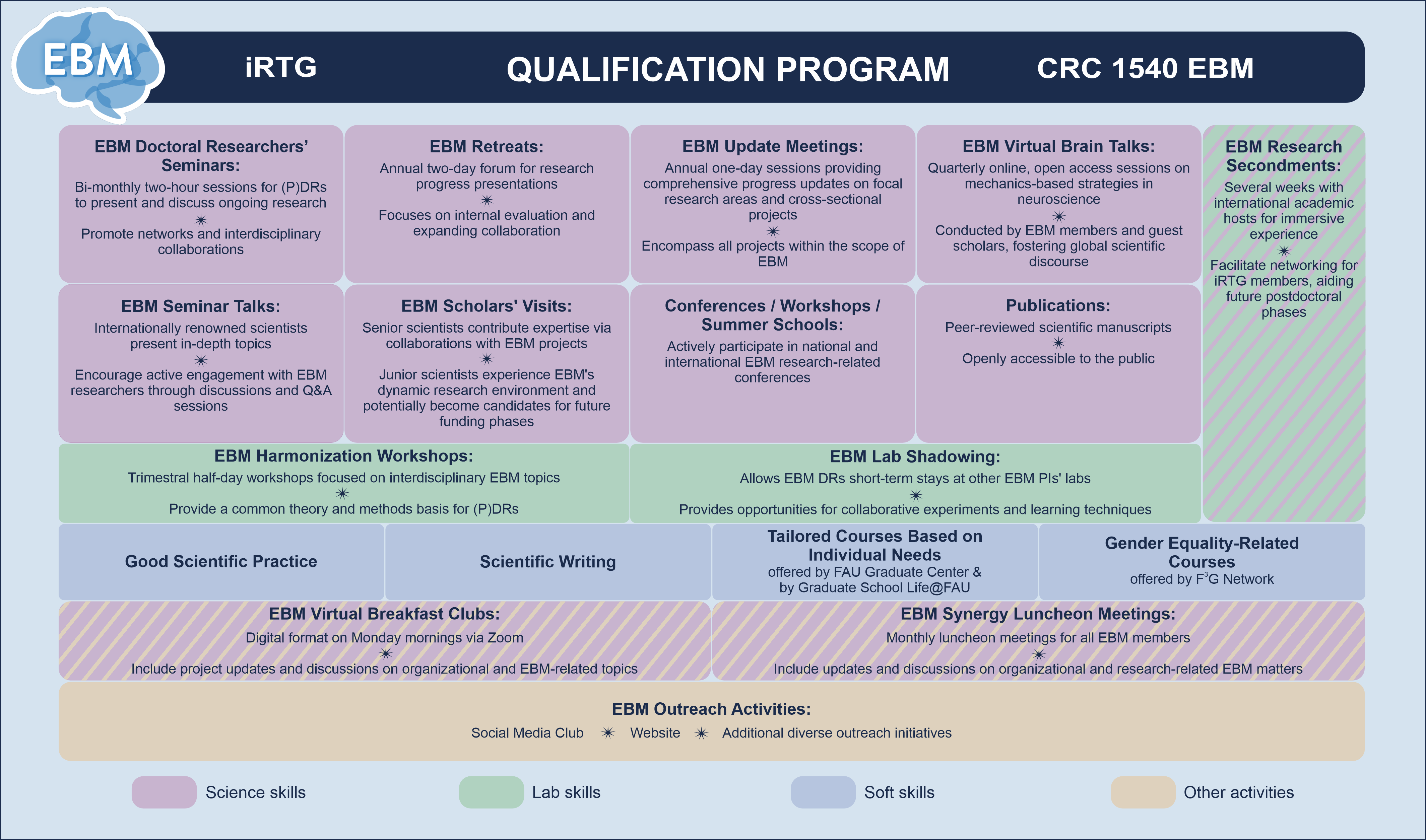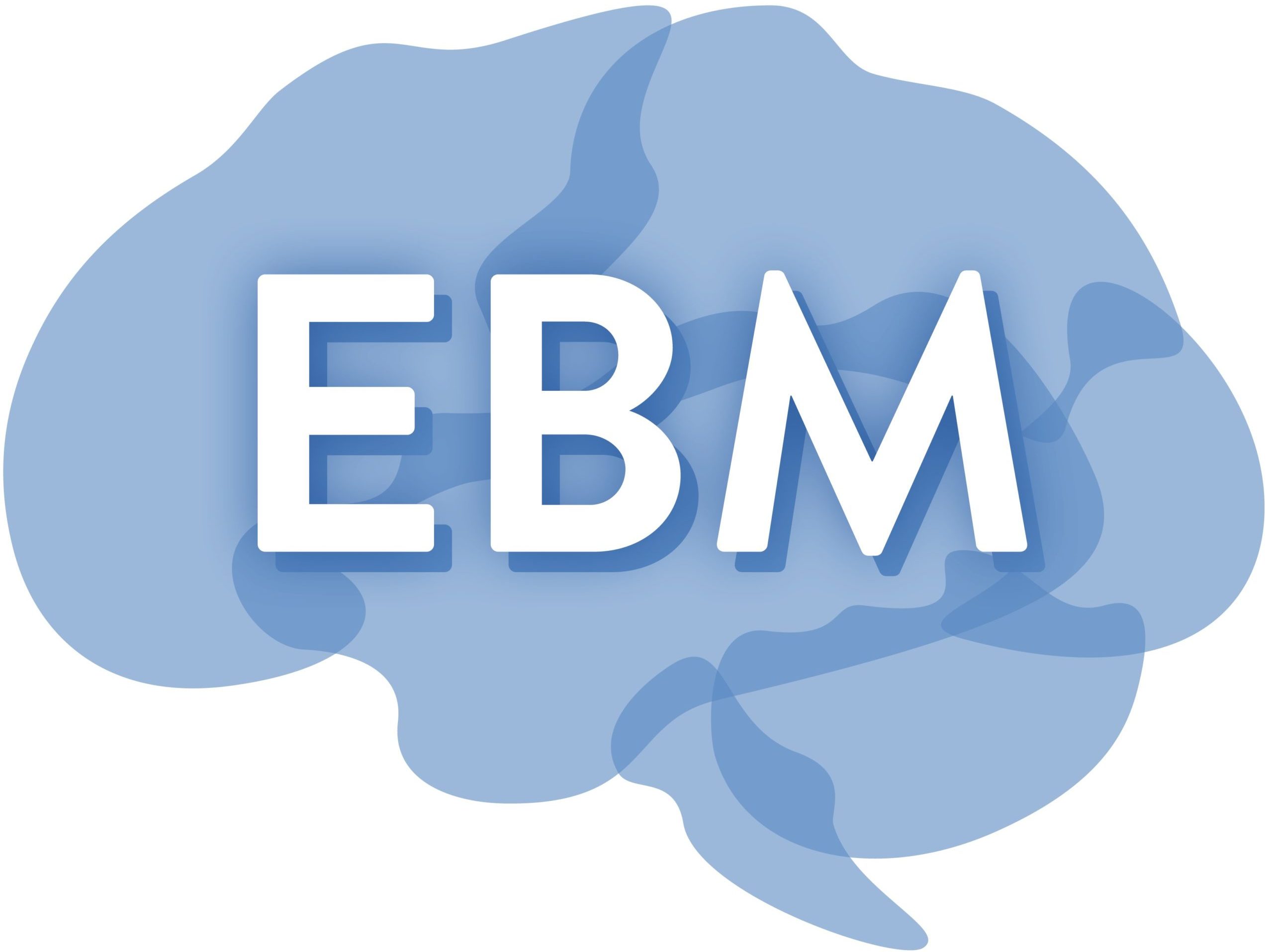EBM iRTG 1540

To access a condensed overview of the iRTG EBM 1540 qualification program, please download our flyer. Click here to view and download.
EBM iRTG 1540 – IN A NUTSHELL
Due to its exceptional interdisciplinary nature, encompassing fields such as experimental analysis, clinical investigations, and bioengineering, all underpinned by advanced modeling and simulation techniques, the integrated Research Training Group (iRTG) plays a crucial role within the CRC by fostering collaboration among these diverse disciplines on a unified platform.
EBM‘s iRTG addresses this demanding interdisciplinary challenge by providing a structured, mandatory qualification program and ensuring quality management and control for doctoral and postdoctoral researchers. This approach also nurtures their scientific independence and promotes their career development.
The comprehensive program encompasses a range of activities aimed at enhancing theoretical knowledge, methodological skills, soft skills, and fostering a collaborative research environment.
QUALIFICATION PROGRAM
The qualification program consists of the following core activities:
These two-hour seminars provide opportunities for (post-)doctoral researchers to present their work-in-progress and results. Discussions on current challenges and future research perspectives are encouraged in a relaxed and interdisciplinary atmosphere, aiming to foster networks among doctoral and postdoctoral researchers and catalyze new research directions and collaborations.
These trimestral half-day workshops offer focused introductions to interdisciplinary topics relevant for EBM, aiming to provide a common theoretical and methodological basis for doctoral researchers. Orchestrated by EBM PIs and postdoctoral researchers from various disciplines, the workshops cover a broad spectrum of theory and methods through lectures, exercises, laboratories, and tutorials.
These half to full-day EBM Soft Skills Courses draw primarily from the portfolio offered by the Graduate Center (GC) of FAU. In addition, the F3G network (Research Consortia for Promoting Equality at Friedrich-Alexander-Universität Erlangen-Nürnberg) provides various gender equality measures, including lectures and seminars on topics such as women’s advancement and gender sensitivity, which members of affiliated research alliances can attend. EBM doctoral researchers actively participate in these offerings and others.
EBM Retreats:
Annual two-day EBM Retreats provide a forum for research progress presentations of the doctoral and postdoctoral researchers. The main focus is on the internal evaluation of scientific progress in the field of EBM and the promotion of the expansion of existing collaborations as well as the establishment of new collaborations between EBM projects. These events are held at remote locations away from the FAU campus and include social activities to encourage informal interaction between participants.
EBM Update Meetings:
Annual one-day EBM Update Meetings provide a comprehensive progress update on all ongoing EBM projects.
These components are complemented by active participation in international conferences, the publication of at least one paper, participation in and organization of Lab Shadowing, and writing short contributions for the EBM homepage after organizing EBM-funded activities or travel. In addition, (post-)doctoral researchers have the opportunity to complete research stays abroad as part of the program.
Beyond these core elements, additional activities include:
The digital format “EBM Virtual Breakfast Club“ typically takes place on Monday mornings (excluding days with the scheduled EBM Lunches). Attended by all EBM members through Zoom in an informal setting, updates on the individual projects were given by the respective project leaders. In addition to the project updates, these virtual meetings serve as a relaxed forum for informal discussions on organizational, administrative and current EBM-related topics.
EBM Synergy Luncheon Meetings:
On the first Monday of every month, all EBM members have the opportunity to meet for lunch together in one of the Chairs or in local restaurants. These in-person meetings provide a relaxed environment for more informal discussions on organizational, administrative and current EBM-related matters. Not to mention the opportunity for social networking.
The EBM Virtual Brain Talk Series is a quarterly virtual, open-access event dedicated to exploring the latest advancements in mechanics-based approaches. Its primary focus is on enhancing our understanding of the functions of the central nervous system, laying the groundwork for future breakthroughs in the diagnosis and treatment of neurological disorders. The approximately 45-minute presentations, distinguished by their high-quality content, are held by EBM members and invited scholars. These sessions are designed to foster a continuous exchange of results and ideas within the worldwide scientific community.
For the EBM Seminar Talks, internationally renowned scientists are invited to give in-depth presentations on EBM-relevant research topics and then to actively engage EBM researchers in discussions and question-and-answer sessions.
Ongoing short-term EBM Scholars’ Visits from outstanding senior and junior scientists as well as from international postgraduate students serve different purposes. The former contribute their cutting-edge scientific expertise via presentations and research collaborations with EBM projects. The latter experience the lively and dynamic research spirit within EBM and add to a pool of potential doctoral/postdoctoral researcher candidates for future funding phases.
Biennial four-week EBM Research Secondments to international academic hosts, including the EBM Mercator Fellows, enable the doctoral and postdoctoral researchers to acquire international experience, perspective, and exposition. The research secondments support establishing networks for the iRTG members and will thus pave the way for future postdoctoral phases (early and advanced).
Ongoing EBM Lab Shadowing allows EBM doctoral researchers to conduct short-term collaborative stays at the laboratories of other EBM PIs, e.g., to participate in joined experiments, to learn experimental, modeling and computational techniques of common interest, and to prepare overarching, multi-disciplinary EBM publications and presentations.
MENTORING TEAMS:
Comprising two principal investigators (PIs) from complementary disciplines and EBM projects, guiding and advising the iRTG (associated) doctoral and postdoctoral researchers through annual meetings.
EBM iRTG 1540 – REQUIREMENTS
DOCTORAL RESEARCHERs, DRs
Mandatory:
- Attend 4 out of 6 (Post-)Doctoral Researchers‘ Seminars annually.
- Participate in 8 out of 16 Harmonization Workshops (theory and methods) within 4 years.
- Complete 1 course on “Good Scientific Practice.”
- Complete 1 course on “Scientific Writing.”
- Participate in 2 additional Soft Skills Courses within 4 years.
- Attend all EBM Retreats and EBM Update Meetings.
- Publish 1 scientific manuscript within 4 years.
Expected:
- Attend Virtual Breakfast Clubs and EBM Lunches.
- Attend Virtual Brain Talks.
- Attend EBM Seminar Talks.
- Participate in and/or organize Lab Shadowing.
- Write short contributions for the EBM homepage after organizing EBM-funded activities or travel.
Optional:
- Research Secondments are elective during the doctoral program.
ASSOCIATED DOCTORAL RESEARCHERs, aDRs
Mandatory:
- Attend all EBM Retreats and EBM Update Meetings.
Expected:
- Attend (Post-)Doctoral Researchers‘ Seminars.
- Attend Harmonization Workshops (theory and methods).
- Complete 1 course on “Good Scientific Practice.”
- Complete 1 course on “Scientific Writing.”
- Publish 1 scientific manuscript.
- Attend Virtual Breakfast Clubs and EBM Lunches.
- Attend Virtual Brain Mechanics Talks.
- Attend EBM Seminar Talks.
- Participate in and/or organize Lab Shadowing.
- Write short contributions for the EBM homepage after EBM-funded travel.
(ASSOCIATED) POSTDOCTORAL RESEARCHERs, (a)PDRs
Mandatory:
- Attend all EBM Retreats and EBM Update Meetings.
Additionally, it is expected to participate in various training activities, such as:
- Contributions in peer-reviewed journals.
- Training in data management.
- Training in time management.
- Training in good scientific practice.
- Scientific writing skills.
- Fostering leadership and organizational skills.
- Developing entrepreneurial skills.
- Training in equal opportunity.
- Developing social and communication skills.
- Contribution to the organization of events in the EBM program.
- Active participation in internal networking and EBM events ((Post-)Doctoral Researchers’ Seminars, Harmonization Workshops, Virtual Breakfast Clubs, EBM Lunches, EBM Seminars, Virtual Brain Mechanics Talks, Lab Shadowing, …).
- Participation in international activities outside of Erlangen.
